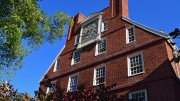Harvard’s hiring freeze will continue, President Alan M. Garber wrote in a statement to faculty and staff on Monday, as the University prepares for up to $1 billion per year in lost revenues in fiscal years 2025 and 2026.
Accommodations for special cases, including essential positions and gift- and grant-funded projects, will continue, Garber said in the statement, which outlines other potential repercussions of the federal government’s financial assault on the University.
The University-wide hiring freeze, first announced in March to prepare for the federal government’s termination of research grants and contracts with Harvard, was initially described by the administration as “temporary.” Garber wrote in the March statement that the plan was to “to leave the pause in effect for the current semester” and “revisit that decision as circumstances warrant.” It was in line with a larger goal to tighten the University’s budgets.
Since then, the University has faced further financial challenges, including efforts to prevent international students from enrolling at Harvard. After the passage of the federal reconciliation bill earlier this month, the federal income tax on Harvard’s endowment—which makes up about 40 percent of the University’s annual operating budget—will rise from 1.4 percent to 8 percent. Garber notes that “dramatic reductions” in funding from the National Institutes of Health, the National Science Foundation, and other federal agencies have also been proposed. The combined financial toll on the University’s budget could approach $1 billion annually, Garber wrote.
The University has allocated $250 million as bridge funding to continue some research, but “additional steps are needed to address long-lasting declines in important sources of funding and increases in the costs of research and teaching,” Garber wrote.
He also noted that although Harvard’s ability to host international students and scholars through the Student and Exchange Visitor Program has seen “preliminary legal relief,” the situation is still subject to change.
Each school and administrative unit will make “strategic, structural, and sustainable decisions that create greater financial capacity while accounting for distinctive priorities and needs,” Garber wrote.
Harvard has filed two lawsuits against the Trump administration: one challenging the cuts to research funding and another challenging the restrictions on hosting international students. Garber wrote that he hopes the courts will reverse some of the administration’s actions and “alternative sources of funding will be successful.”
The trial in the research funding suit is scheduled to begin on July 21. The University has reportedly been engaged in negotiations with the Trump administration.
Noting these “unprecedented challenges” that “have led to disruptive changes, painful layoffs, and ongoing uncertainty about the future,” Garber wrote that Harvard’s faculty and staff will “meet these challenges together” and “will continue to benefit from our commitment to one another and the commitment of Harvard and every research university to serving the nation and the world through our core mission of teaching, learning, and research.”
Read the full announcement—signed by Garber, Provost John Manning, Executive Vice President Meredith Weenick, and Vice President for Finance Ritu Kalra—here.









